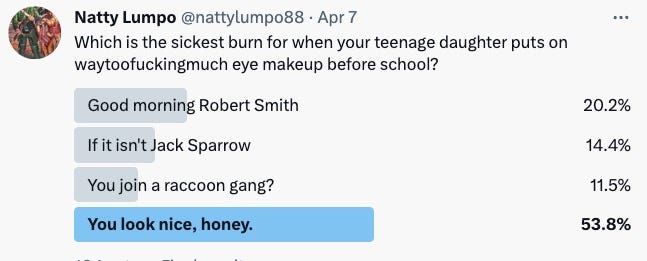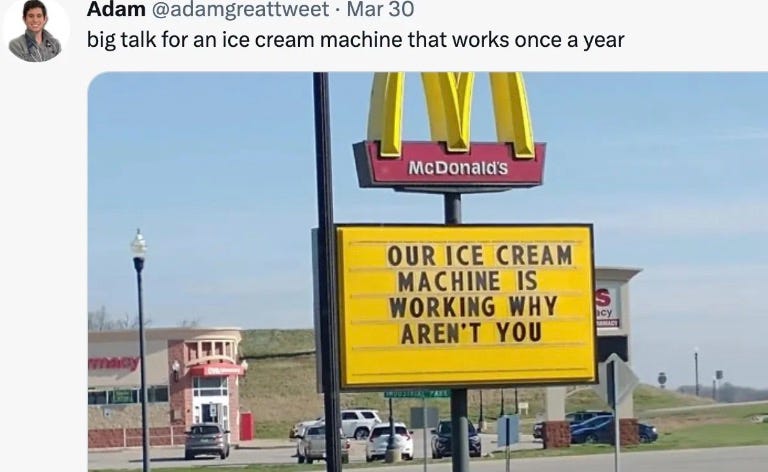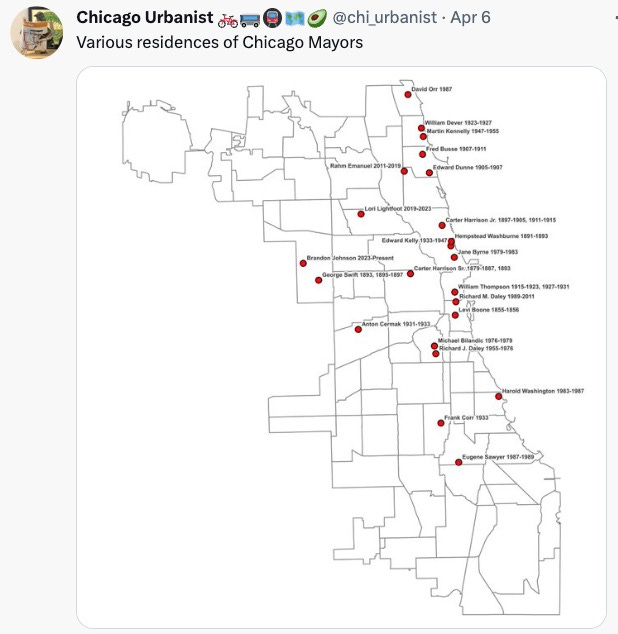Words can hurt, yes, but where's the line?
& readers react to my "present" vote for mayor last Tuesday
To read this issue in your browser, click on the headline above.
4-11-23
Eric Zorn is a former opinion columnist for the Chicago Tribune. Find a longer bio and contact information here. This issue exceeds in size the maximum length for a standard email. To read the entire issue in your browser, click on the headline link above. Become a paid subscriber to receive each Picayune Plus in your email inbox each Tuesday and join our civil and productive commenting community.
On the air
I’m guest hosting for the vacationing Joan Esposito from 2-5 p.m. today (Tuesday) on WCPT-AM 820. My guests will include journalist and authors Mark Guarino, to talk about his new book “Country and Midwestern: Chicago in the History of Country Music and the Folk Revival;” Douglas Fraser, executive director of the Chicago Help Initiative, to talk about the conditions in which asylum seekers are being housed in the city; elections numbers guru Scott Kennedy, to talk about what a granular look at last week’s returns reveals; and local cable-TV host Jeff Berkowitz, to talk about what role if any his 2009 interview with Paul Vallas just might have played in his recent loss to Brandon Johnson. Listen live on the stream here.
Butting out
Two readers contacted me about the passage in Thursday’s main edition of the Picayune Sentinel in which I referred to the “butt-hurt vitriol” in the epic concession speech of conservative Wisconsin Supreme Court candidate Dan Kelly.
“Butt-hurt,” slang for an overemotional, irritated, resentful response to a setback or criticism, is actually an anti-gay slur, they said.
One of them wrote:
It is a way to mock someone who is whining that also mocks anal rape, a very real risk for queer men and transgender women. It also degrades consensual anal sex between two people, most likely gay men.
Now of course I didn’t mean it that way, and the two who called me out were doing so as a private, friendly point of information, not a public accusation.
I was curious about their claim, since my understanding of the term had been that the person was reacting as though having been spanked.
Know Your Meme backs up that interpretation and doesn’t allude to any anti-gay connotations. I didn’t find any implication of “butt-hurt” (also spelled “butthurt”) being related to anal sex in conventional online dictionaries, the online slang dictionary or at Urban Dictionary.
I did find a January, 2016 article in The Advocate, an LGBT focused publication, headlined “Don't Let the Language Police Get You 'Butthurt'“
The term "butthurt," while occasionally used in a homophobic context, "is only as old as the late 1990s, in reference to spanking an unruly child," and (Doug Bigham, assistant professor of linguistics at San Diego State University) believes that renouncing the term based on a few homophobic trolls adopting it "would be irresponsible linguistics and irresponsible history.”
Now, of course, that was seven years ago and language does evolve, though that evolution often occurs after cultural battles, as we saw when the internet went crazy at the end of last year over the Elimination of Harmful Language Initiative at Stanford University. That initiative, since withdrawn, labeled a number of fairly ordinary terms to be problematic — American, brave, immigrant, cakewalk, prisoner, trigger-warning, landlord and homeless, for example.
The questions that those who are irritated and resentful at being told what words they can and cannot say without provoking outrage or misunderstanding are: “Who decides? And “What sort of consensus creates a threshold of offense?”
That threshold does get crossed.
“Retarded,” for instance, once a standard, everyday term to refer to those with intellectual disabilities, is now almost universally understood to be an offensive term, having been co-opted by those who used it as an insult. “Retarded” and “retard” were not marginalized overnight, but instead slowly removed from polite discourse as more and more people came to understand how the hurtful use of those words had made them no longer acceptable.
Has “butt-hurt” been used often enough as an understood allusion to anal rape or gay anal sex that it’s been transformed into a slur after many years of being understood as an allusion to corporal punishment? I don’t see the nexus, myself — anal rape and anal sex are not confined to certain sexual orientations. The same logic would make “pain in the ass” a homophobic slur (not to plant any ideas).
I have no particular attachment to “butt-hurt” and will have no trouble eliminating it from my vocabulary on the off chance that it’s misunderstood, but I’m left with the questions of how we, as a culture, decide what words and terms are “offensive.” It can’t simply be what the most sensitive, most easily aggrieved people believe is even slightly demeaning — otherwise we’d all be spelling it “womyn” — but it also can’t be only those words with deeply ugly histories that have been hurled for decades with ill intent.
In last December’s Picayune Plus, “All-points bulletin for the language police” looked at poll results for such terms as “pregnant women,” “breastfeeding,” “Latino/Latina” and others that seem to have entered the controversy portal. The poll suggested that “Birthing parent,” “chestfeeding” and “Latinx/Latine” haven’t yet moved into the mainstream and shoved their rough equivalents to the margins of acceptability but I find the process itself intriguing.
It’s not purely a popularity contest, of course. The ancient slur “redskin” actually enjoyed majority approval among American Indians/indigenous peoples/ Native Americans in some polls, but the fact that a significant minority found the term degrading and offensive held sway. That slur is now on history’s trash heap.
When it comes to terms that are still evolving, the best argument against them is to explain why some people may find them offensive, not to simply declare that they are offensive, If and when the case gets strong enough, the language will change.
Notes and comments from readers —lightly edited —- along with my responses
My “present” vote for mayor, in which I went to the polls last Tuesday, took a ballot for mayor and , after much thought, left it blank, drew quite a bit of comment, most but not all of it negative.
Steve H. — The way you managed to twist yourself into the untenable position that casting a blank ballot was anything besides a blatant cop-out is truly remarkable. Yes, it was a remarkably unusual election, but you still copped out.
I felt almost exactly the same way as you did. Couldn't bring myself to vote for Vallas, had serious reservations about Johnson. But, one of them was gonna win and, after laying my mail-in ballot out on the table, I finally concluded that I'd rather hope that Johnson will rise to the occasion more ably than some folks think than hope that Vallas will not be as bad as is assumed by me and many others.
Why you chose this particular occasion to abandon the long-standing "better of two evils" policy that is pretty much part-and-parcel of being a voter in this benighted country is beyond me. (Not that either of them are actually evil, mind you.) There haven't been very many times when I've been 100% behind any candidate, for crying out loud. Somebody was going to win, and your choice ceded a greater influence in determining which one would to some MAGA yahoo in Mt. Greenwood, for crying out loud.
I do appreciate your having the guts to publicly explain yourself, but am quite disappointed.
Steve H. (not the same one) — You wrote “What amounted to a ‘present’ vote felt like a cop out, an abdication of responsibility and act of indifference to a cherished right" It felt that way because it was. You should be ashamed. As a wise person pointed out, a candidate isn't a taxi; they're a bus. Get on the one that promises to take you closest to your destination.
As I said, the problem I had with Brandon Johnson is that I don’t think his promises are realistic and in some cases they strike me as potentially destructive. The financial transactions tax and the employee head tax both seem likely to drive employers out of the city, for instance. He struck me as by far the candidate with the biggest potential upsides and downsides; Vallas, despite his campaign rhetoric, was much more the status quo candidate.
I may come to regret not having more faith in Johnson. In fact I hope to.
Terry S. — Surely there was one who you think was better than the other. I get the liberal recoil at Vallas, but isn't it inevitable that Johnson will basically turn over city governance and fiscal policy to the teachers' union and the rest of the public workers' unions? They put him into office; honestly, is he going to defy them? The pension system is quite close to a literal bomb that will go off.
Karen K. — I think you should have voted. I totally understand your position, but I don't think you can complain about Johnson unless you voted.
You underestimate my commitment to complaining. And how can those who voted for Johnson — whose imprimatur put him in office — then complain about him should his performance not match his rhetoric?
Chuck W. — I’m surprised that so many people did not vote, given the clear choice and the likelihood that the election would be close so that their votes would matter. I’m sure that some of it can be attributed to apathy or total disillusionment with government and politics. I guess some of these folks, like you, just couldn’t generate enough enthusiasm for either candidate (or enough disdain for one of the candidates) to actually vote. I would love to see more research and analysis about why people didn’t vote in this election since there was a clear choice, which is not always available in every election.
Monica M. — You completely validated my deep distress about voting for either candidate. I feel so seen!
Michael M. — If you need company re. the mayoral race, you’ve got it. That was the first time in my life I didn’t vote.
Teresa S . — Like you, I cast a blank ballot for mayor. I stood in the booth for a couple of minutes debating and in the end I could not select either one of them.
LCD — I think your “vote” counts. It had the same effect as half a vote to each, while registering in the turnout number and making a statement that you’re not too apathetic to go to the polls. But to do what you did, a voter has to feel truly conflicted. Once you get to feeling 60-40 it’s time to pick a side.
My enthusiasm for each candidate was down in the 30% range and so when faced with a choice I wavered with nausea back and forth over the 50-50 line.
Marc M. —I wish there were a “none of the above” choice on the ballot so that we could get an idea of the level of dissent. It would also enlighten the winner on their true level of support.
To my mind, casting a blank ballot is equivalent to “none of the above.”
Doug H. — There is absolutely no difference between an extremely well-informed person who does not choose a candidate and a 100% apathetic, uninterested, disengaged person who does not choose a candidate. Johnson apparently won with about 17% or 18% of the registered voters choosing him…so evidently a minority coalition of African Americans, teachers and younger Bernie Sanders-inspired progressives had their day.
This is also another case where the candidate with a largely opaque background, and much less relevant experience, and therefore fewer specific actions to criticize, has won. In many political races it seems that the thinner your resume is, the more comfortable voters are in supporting whatever you say, regardless of whether or not you have actually done something relevant in any of the areas you speak of.
Chicago has elected a minor league, vastly inexperienced Mayor for the second time in a row, and the next four years will produce an ocean of rhetoric wallpapering over a floundering mayor who will be overwhelmed by Chicago’s many problems.
This is a nice segue into the letters I received on the topic of…
Mayor-elect Brandon Johnson
Ray P. — Don't give Mayor-elect Brandon Johnson a chance.. Hold him accountable. Chicago has very little chances left, I fear.
Jake H. I live in Oak Park now, but I would have voted for Vallas, and I would have felt fine about it. I'm a liberal Democrat who has little patience with the progressive excess and magical thinking of the recent awokening. I don't think I've changed much. I think my team has, and it's a bummer.
As mayor, Johnson will have precious little resources to address the "root causes of crime," which are complex and beyond his power to affect much. Some commenters note that crime in the '80s and early '90s was worse. Yes, but it got a lot better, in Chicago and around the country, especially in New York. Why? Scholars debate, but there's a persistent unwillingness to face squarely the most likely reason: bad guys were sent to their room.
I'm supposed to feel guilty about the phrase and sentiment, "tough on crime." But I'm not sure what one is supposed to be tough on if not crime, especially violent crime. I'm against excessive punishment and inhumane confinement. I've always opposed the war on drugs. But I'm very much in favor of a war on gun violence. Is Johnson?
One root cause of crime is lack of opportunity. What is Johnson going to do to encourage economic development in Chicago, to encourage investment in Chicago, to stem population loss and make Chicago a place that attracts migration and business instead of pushing it away? Does anyone have any confidence in Johnson on these fronts? I don't.
It would be nice if our city, metro, and state were not in competition with everywhere else, but it's foolish to pretend that it's not. Our region is in relative decline. This should be seen as an emergency, because everything everyone cares about -- left or right -- hinges on it.
I don't like Vallas's all-in on charters and "school choice," but, as mayor, he would not have been able to dictate that agenda. He would have faced a formidable opponent in the CTU. I'm pro-union and pro-teacher (I'm one), but I think on balance the city and its kids would've been better served by having a conscientious adversary in City Hall rather than its own man. So, even on schools, I think Vallas was the better choice.
But I'm with you: Give the guy a chance. The surest cure for pessimism is things going well, and I'm ever open to the evidence. I leap it at. We shall see.
Jim A. — I do not understand why mayor-elect Brandon Johnson wants to get rid of Chicago Public Health Commissioner Dr. Allison Arwady. She was steady and provided fine leadership in the pandemic. Plus she wants to stay in the job. Any chance he will retain her?
I’ve heard rumblings about a change.org online petition being created to put some pressure on Johnson to at least explain why he wants to toss Arwady overboard. I’m not a big believer in online petitions, but I’ll publicize this one should it happen.
On Wisconsin
Michael G — Miserable right-wing curmudgeon (to put it politely) Dan Kelly does not "have a point." After hearing judicial nominee after judicial nominee lie and dissemble about their views on critical issues, we had a nominee in Wisconsin who said clearly she felt that Wisconsin’s abortion ban was unconstitutional and that the extreme gerrymandering in the state was unconstitutional. She won decisively against an opponent who believed otherwise. What could be more democratic?
I agree with the politics and positions of Justice-elect Janet Protasiewicz and am thrilled at her victory, but I do think it would be better if judges were not just like other politicians. There was a glimmer of wisdom in the Tribune oped last week “Wisconsin’s Supreme Court election should never have happened” by Adam Carrington, associate professor of politics at Hillsdale College in Michigan .
The Founders thought judges needed distance, if not outright independence, from any manifestation of popular will other than written constitutions and statutes. Along with longer tenures, executive nomination and legislative consent created some of that distance. So judicial elections undermine all of this. They tempt judges to promise and to decide in line with the people’s current opinion, even if such things run contrary to the written law. Doing so undermines the rule of law and thus invites the problems that accompany lawless rule by the people.
Of course because he couldn’t resist, Carrington pointlessly adds “all indications are that Protasiewicz will be misguided and harmful in how she interprets and applies the law,” thus destroying any majesty his argument might have and reminding us that conservatives have for years been relentlessly installing ideologues on the courts.
Etc.
JayG — Why do you allow daily voting for the Thursday Tweet of the Week poll but only a single vote over the span of the contest for Tuesday’s visual Tweet of the Week poll?
The embedded visual tweet poll on Substack has a number of limitations -- five entries max, options have to be short, any effort to edit the poll (correct a typo, for instance) results in all the votes being reset and one vote per poll per reader. It was my incompetence that allowed people to vote more than once in the regular weekly poll, and after your comment I fixed that setting starting with the current poll. And I’ve seen a dropoff in the overall number of votes that appears significant.
Dances With Dogs — You referred to Laurie Higgins as “a strong contender for Illinois’ most batty conservative.” I object! Bats should be valued for their contributions to society and to our natural world, not defamed in a comparison to Laurie Higgins.
Apologies tendered to the Chiroptera community.
Ya gotta see these tweets!
I often run across tweets that rely on visual humor and so can’t be included in the Tweet of the Week contest (the template I use for that poll does not allow me to include images). Here are a few good ones I’ve come across recently:
Before you vote, and if you’re unaware, as I was, below is the Robert Smith referred to in Natty Lumpo’s eye-makeup tweet. He’s the lead singer for the rock band The Cure:
Vote for your favorite. I will disqualify any tweets I later find out used digitally altered photos. I’ll share the winner in Thursday’s main edition.
Meanwhile, here is an interesting graphic posted to Twitter by Chicago Urbanist:
There’s still time to vote in the conventional Tweet of the Week poll!
Thank you for supporting the Picayune Sentinel. To help this publication grow, please consider spreading the word to friends, family, associates, neighbors and agreeable strangers.
.
















Regarding what is acceptable language: A number of years ago a well-educated colleague friend came back from visiting her small town in the Midwest and told me gleefully that she had "Jewed down" a farmer's market vendor. I pointed out that this was a very offensive, anti-Semitic slur, and it hurt me deeply (especially being Jewish) to hear it come out of her mouth. She was amazed, didn't realize she had even used the phrase, and had no idea about its history. She also apologized and said the phrase was always used as she grew up, and she had never even thought about it! Sometimes education is all we need to change historically anti-Semitic or racist language that has become embedded in our culture.
Now I am 72, and butt-hurt seems to be a relative newcomer in our language. But until this column I had never heard that phrase uttered in reference to spanking or anal sex. I had never read it. I have been out as a gay man since 1974. I have heard a lot of slang about sex. Some of it is distasteful, as the NYT once described homosexuality in general., and vulgar when used in mixed company. But an example of a word not only used by the LGBTQ community, but championed by it, is one of the most hurtful things a straight person could use against a gay man. Queer. I still hear it like a slur, and it brings back such talk as "you dirty queer," which I have been called many times. I worked in the newspaper business 43 years, and some of that time was definitely not in the politically correct era. But I never heard anyone use queer or butt-hurt in the newsroom, though that probably was because the speaker was not in earshot. Not even the f word. The same publication, the Chicago Tribune, once ran a headline on a Page 1 column that read something to the effect of "Women convert from lesbianism to Catholicism."
But queer still stings like a hornet